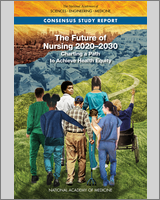Nurses are prepared to act individually, through teams, and across sectors to meet challenges associated with an aging population, access to primary care, mental and behavioral health problems, structural racism, high maternal mortality and morbidity, and elimination of the disproportionate disease burden carried by specific segments of the U.S. population.
Nurses are fully engaged in addressing the underlying causes of poor health. Individually and in partnership with other disciplines and sectors, nurses act on a wide range of factors that influence how well and long people live, helping to create individual- and community-targeted solutions, including a health in all policies orientation.
Nurses reflect the people and communities served throughout the nation, helping to ensure that individuals receive culturally competent, equitable health care services.
Health care systems enable and support nurses to tailor care to meet the specific medical and social needs of diverse patients to optimize their health.
Nurses’ overarching contributions, especially those found beneficial during the COVID-19 pandemic, are quantified, extended, and strengthened, including the removal of institutional and regulatory barriers that have prevented nurses from working to the full extent of their education and training. Practice settings that were historically undercompensated, such as public health and school nursing, are reimbursed for nursing services in a manner comparable to that of other settings.
Nurses and other leaders in health care and public health create organizational structures and processes that facilitate the profession’s expedited acquisition of relevant content expertise to serve flexibly in areas of greatest need in times of public health emergencies and disasters.
Nurses consistently incorporate a health equity lens learned through revamped academic and continuing education.
Nurses collaborate across their affiliated organizations to develop and deploy a shared agenda to contribute to substantial, measurable improvement in health equity. National nursing organizations reflect an orientation of diversity, equity, and inclusion within and across their organizations.
Nurses focus on preventive person-centered care and have an orientation toward innovation, always seeking new opportunities for growth and development. They expand their roles, work in new settings and in new ways, and markedly expand their partnerships connecting health and health care with all individuals and communities.
Nurses attend to their own self-care and help to ensure that nurse well-being is addressed in educational and employment settings through the implementation of evidence-based strategies.
